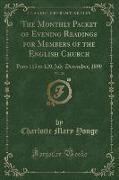Read more
Excerpt from The Monthly Packet of Evening Readings for Members of the English Church, Vol. 20: Parts 115 to 120, July-December, 1890
René of Anjou has been hardly dealt with, as is Often the case with princes, upright, religious, and chivalrous beyond the average of their time; yet without the strength or the genius to enforce their rights and Opinions, and therefore thrust aside. After his early unsuccessful wars, his lands Of Provence and Lorraine were islands Of peace, prosperity, and progress, and withal he was an extremely able artist, musician, and poet, striving to revive the Old troubadour spirit Of Provence, and everywhere casting about him an atmosphere Of refinement and kindliness.
The hall Of his hotel at Nanci was a beautiful place, with all the gorgeous grace Of the fifteenth century, and here his guests assembled for supper soon after their arrival, all being placed as much as possible according to rank. Eleanor found herself between a deaf Old Church dignitary and Duke Sigismund, on whose other side was Yolande, the Infanta, as the Provencals called the daughters of René; while Jean found the Dauphin on one side of her, and a great French Duke on the other. Louis amused himself with compliments and questions that sometimes nettled her, sometimes pleased her, giving her a sense that he might admire her beauty, but was playing On her simplicity, and trying to make her betray the destitution Of her home, and her purpose in coming.
About the Publisher
Forgotten Books publishes hundreds of thousands of rare and classic books. Find more at www.forgottenbooks.com
This book is a reproduction of an important historical work. Forgotten Books uses state-of-the-art technology to digitally reconstruct the work, preserving the original format whilst repairing imperfections present in the aged copy. In rare cases, an imperfection in the original, such as a blemish or missing page, may be replicated in our edition. We do, however, repair the vast majority of imperfections successfully; any imperfections that remain are intentionally left to preserve the state of such historical works.

